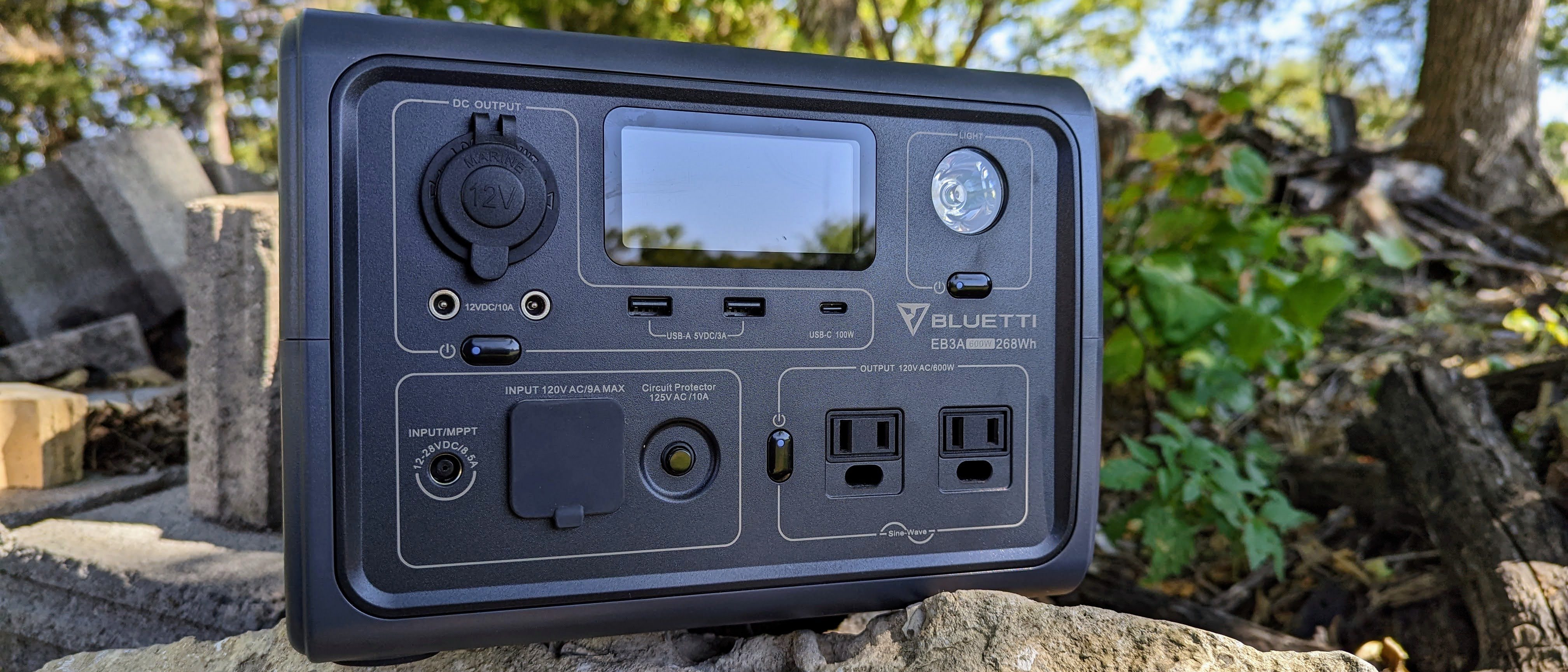Android Central Verdict
The Bluetti EB3A is an impressive power station that offers impressive output in a very compact device. It can provide 600W of power with a surge rating of 1200W from the 268Wh power cell. Bluetti also included the ever-helpful LED area light and a wireless charging pad. I do wish there were more than two AC outlets and a single USB-C port.
Pros
- +
Fantastic power output for such a small device
- +
Can recharge very fast and no bulky charging adapter
- +
Great price
- +
Built-in area light
- +
App connectivity
- +
Can act as a UPS backup
Cons
- -
The Power Lifting feature could be an issue for some devices
- -
Could use a few more ports
- -
The handle feels a bit cheap
Why you can trust Android Central
Bluetti is no stranger to making great portable power devices as it has been doing so since 2019. The latest in the line is the Bluetti EB3A and unlike some of the brand's larger models, this one is a compact power station that leans into portability without sacrificing capabilities. But what makes this power station stand out in a very crowded space? Well, it isn't just one thing. Let's go over why this could very well be my new favorite compact power station.
Bluetti EB3A portable power station: Pricing and availability
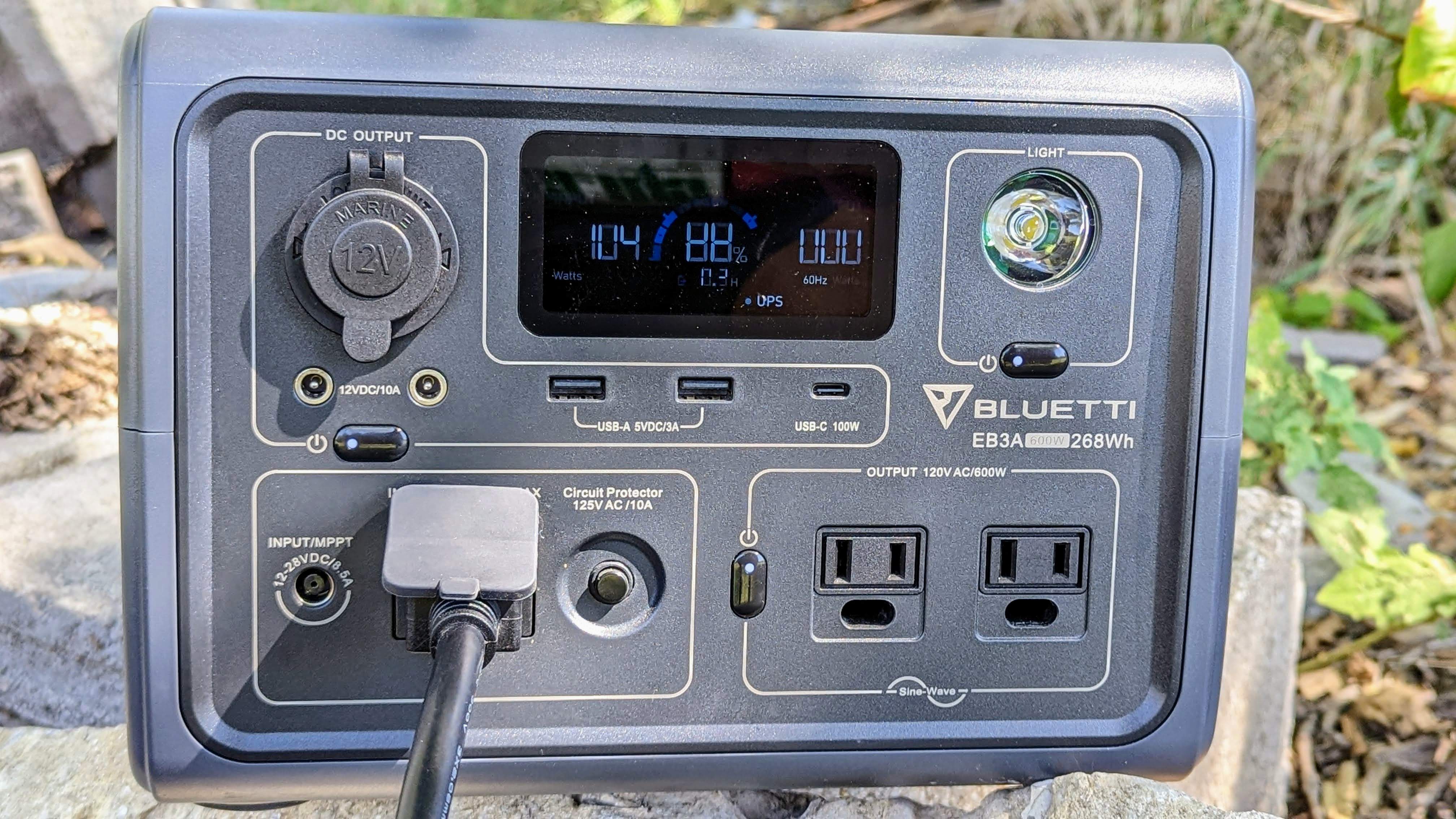
Bluetti launched the EB3A power station in June 2022 with a retail price of $299. The device comes in the familiar Bluetti gray color scheme as the only choice of hue. Availability for the EB3A is through various retailers like Amazon, Walmart, Bluetti, and more. Current pricing is still $299 at most outlets, but it can be found for $239 with online coupons.
Bluetti EB3A portable power station: What's good
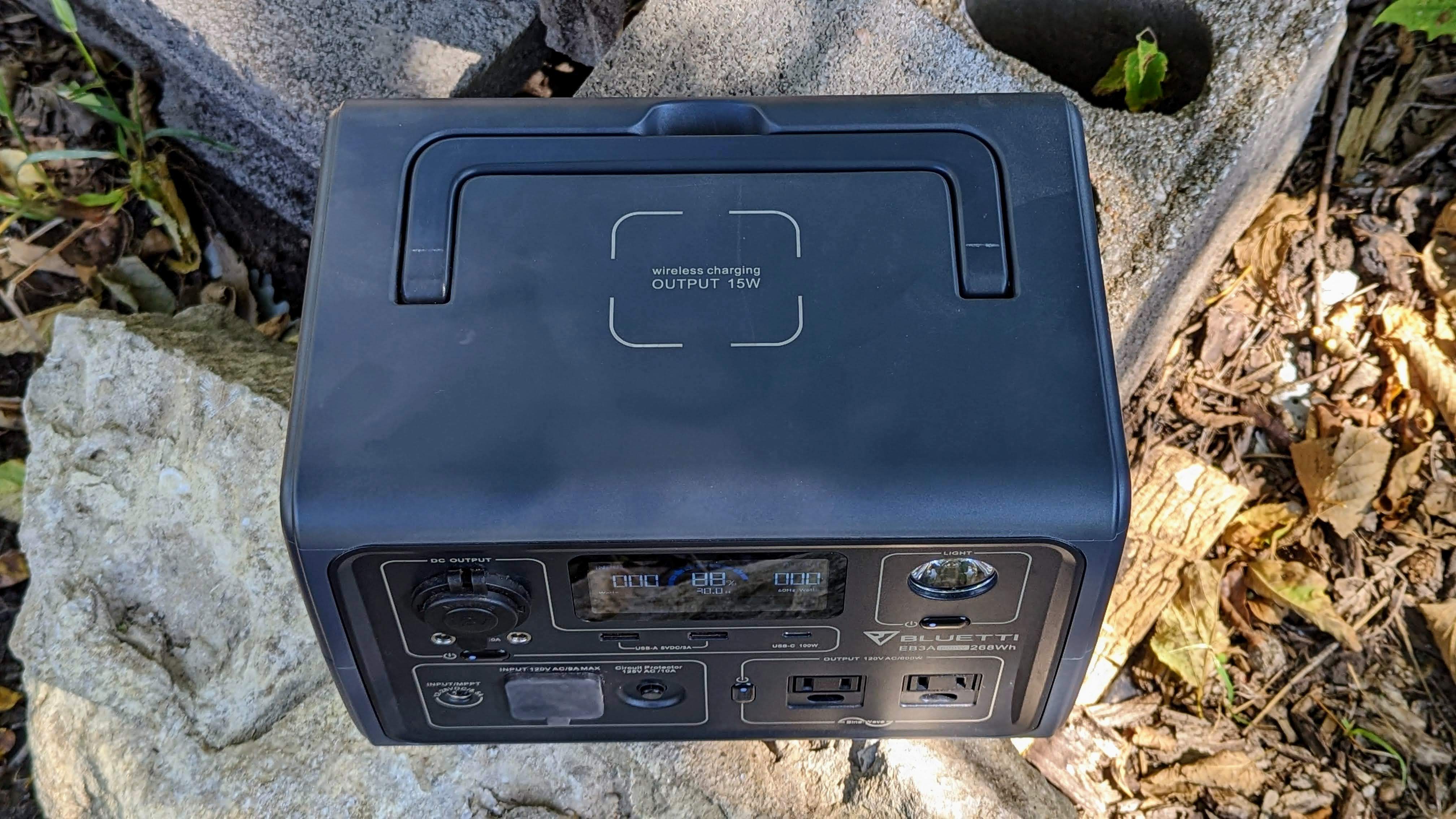
While the Bluetti EB3A isn't the first portable power station I've reviewed from the company, it is the smallest, with its largest dimension at less than eleven inches. I could stack over a dozen of these into the footprint of the massive Bluetti EP500Pro and about eight for the AC200Max. Sure, those power stations have far more ports, capacity, and output, but the compactness of the EB3A is just so impressive.
The Bluetti EB3A is the most powerful and compact power station I've had the pleasure of using.
The size wouldn't stand out so much if it weren't for the performance capabilities of the unit. Other devices are close to the same size or smaller on the best portable power stations list, but those don't offer the 600W output the Bluetti EB3A does. It can run devices that require higher wattages, but more on that later. The power comes from a 268Wh LiFePO4 battery that is rated at 2500+ charging cycles to 80%.
Getting power from the EB3A is possible from the dual AC outlets, two USB-A ports, the single USB-C 100W PD port, a 12V car socket, the 15W wireless charging pad, or the two DC5521 outlets. Bluetti includes a button to enable the DC output ports (USB, car socket, and DC5521), AC outlets, and the very welcomed LED area light. I really like the 3.12-inch display that Bluetti used. It's bright, colorful, and provides helpful info as to the state of charge and output.
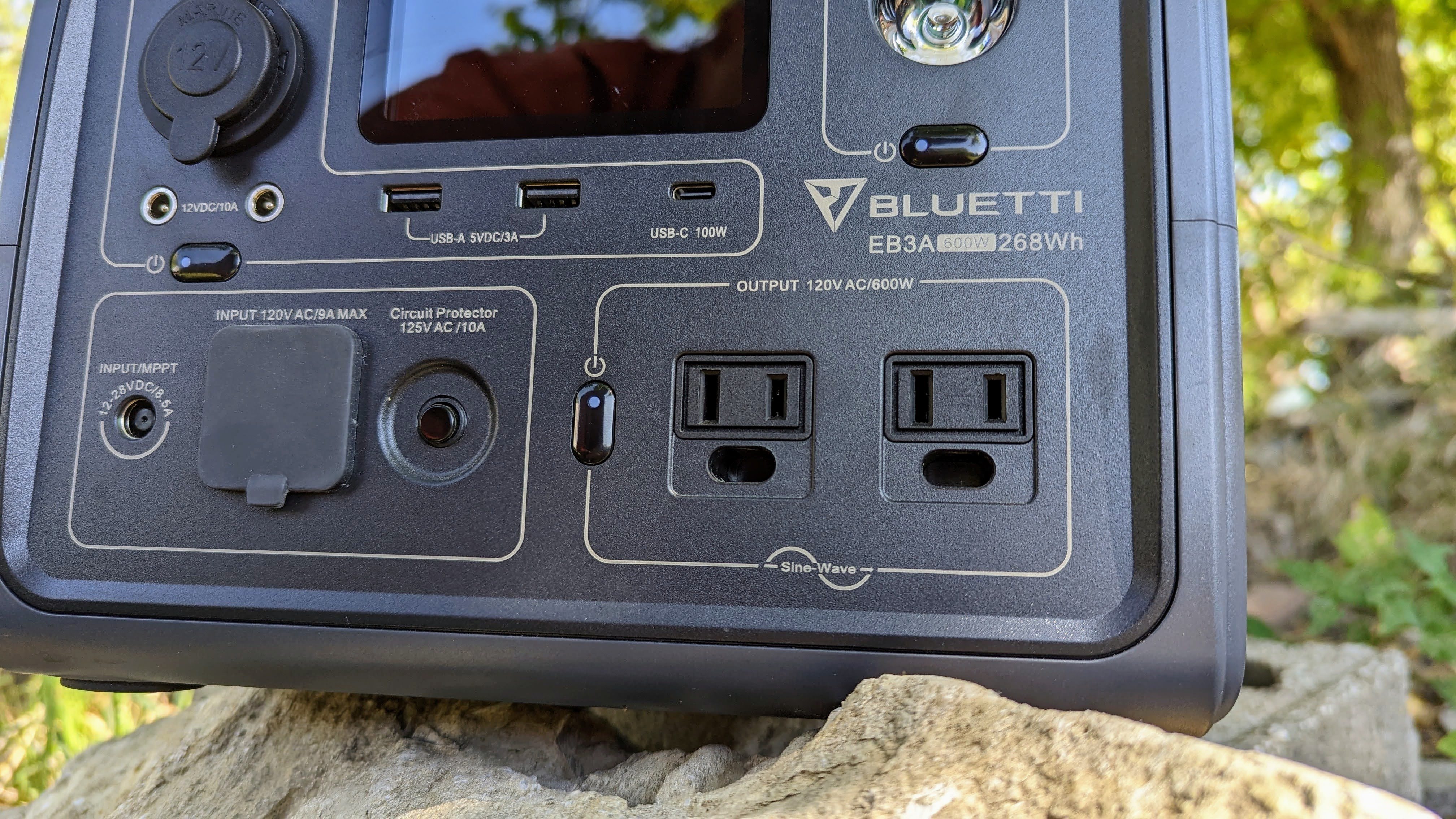
But a power station isn't worth much once the battery is drained. So, you have to recharge it, which is an area Bluetti stepped up for the EB3A. Something that really bugs me about most small power stations is that they usually require a bulky charging adapter when using AC recharge — not this time!
Recharging the 268Wh battery in the EB3A can be astonishingly fast, with 80% charge in as little as thirty minutes.
You can charge this power station with multiple modes or speeds that you change via the Bluetti app that connects over Bluetooth. Each mode changes the maximum charge rate with a maximum of 350W input through AC. Bluetti managed to forgo the external adapter, and when charging over AC, a wall outlet, all that is needed is the provided cable.
Of course, there is more than one way to power up the Bluetti EB3A. While the traditional method of the electrical grid may be the most common way, another great option is solar. This power station can handle up to 200W of solar, and when combining that with AC power, you can get the EB3A from zero to eighty percent in around 30 minutes! A third charging option is through the car socket in your automobile.
| Specs | Bluetti EB3A |
|---|---|
| Dimensions | 10.04 x 7.09 x 7.20 inches |
| Weight | 10.14 pounds |
| Battery | LiFePO4 268.8Wh, 2500+ Cycles to 80% Capacity |
| Expandable | 🚫 |
| Display | 3.12-inch diagonally LCD |
| AC Output (2) | 600W total (surge 1200W), 120V/5A ~ (60Hz) Pure Sine Wave |
| DC5521 Output (2) | 12VDC, 10A Total |
| Car Charger Output | 12VDC, 10A |
| USB-A Output (2) | 5VDC, 3A Total |
| USB-C Output | 100W Max |
| Wireless charging | 15W Max |
| AC Input | 268W Max, 430W Max with AC and Solar Input Simultaneously |
| Solar Charger Input | 200W Max, VOC 12-28VDC/ 8.5A |
| Car socket | 12/24V |
| Protection | Over Voltage Protection, Overload Protection, Over Temperature Protection, Short Circuit Protection, Low Temperature Protection, Low Voltage Protection, Overcurrent Protection, Short Circuit, Temperature Monitoring |
| Connectivity | Bluetooth |
| Environmental Operating Temperature | -4-104℉ (-20-40℃) |
| Storage Temperature | 32-104°F (0-40°C) |
| Weather Resistance | 🚫 |
| UPS Mode | 🚫 |
Going back to the comment I made earlier regarding the output capability of the EB3A, when I said it could handle devices rated higher than 600W, that is done through what Bluetti calls its Power Lifting mode. Using some electrical engineering science, with this feature enabled, the power station can output up to 1200W — well, kind of. The power station will adjust the voltage and the amps to allow devices that need more than 600W to operate.
The Bluetti app isn't as full-featured as some from other brands I've used, but for the EB3A it is just right.
The Power Lifting feature, like the charging modes, is controlled through the Bluetti app. When I reviewed the other Bluetti power stations I wasn't a fan of the app because those devices had more features and output options. However, with the EB3A the app does a great job.
You can see how much power is coming into the power station from solar and the grid, and how much is going out through DC and AC. Of course, you can also see the battery percentage. The app will also allow you to toggle on and off the AC and DC ports, control the LED light, and turn the unit off. You can't turn on the unit from the app as there is no Bluetooth when it is off.
app screenshots
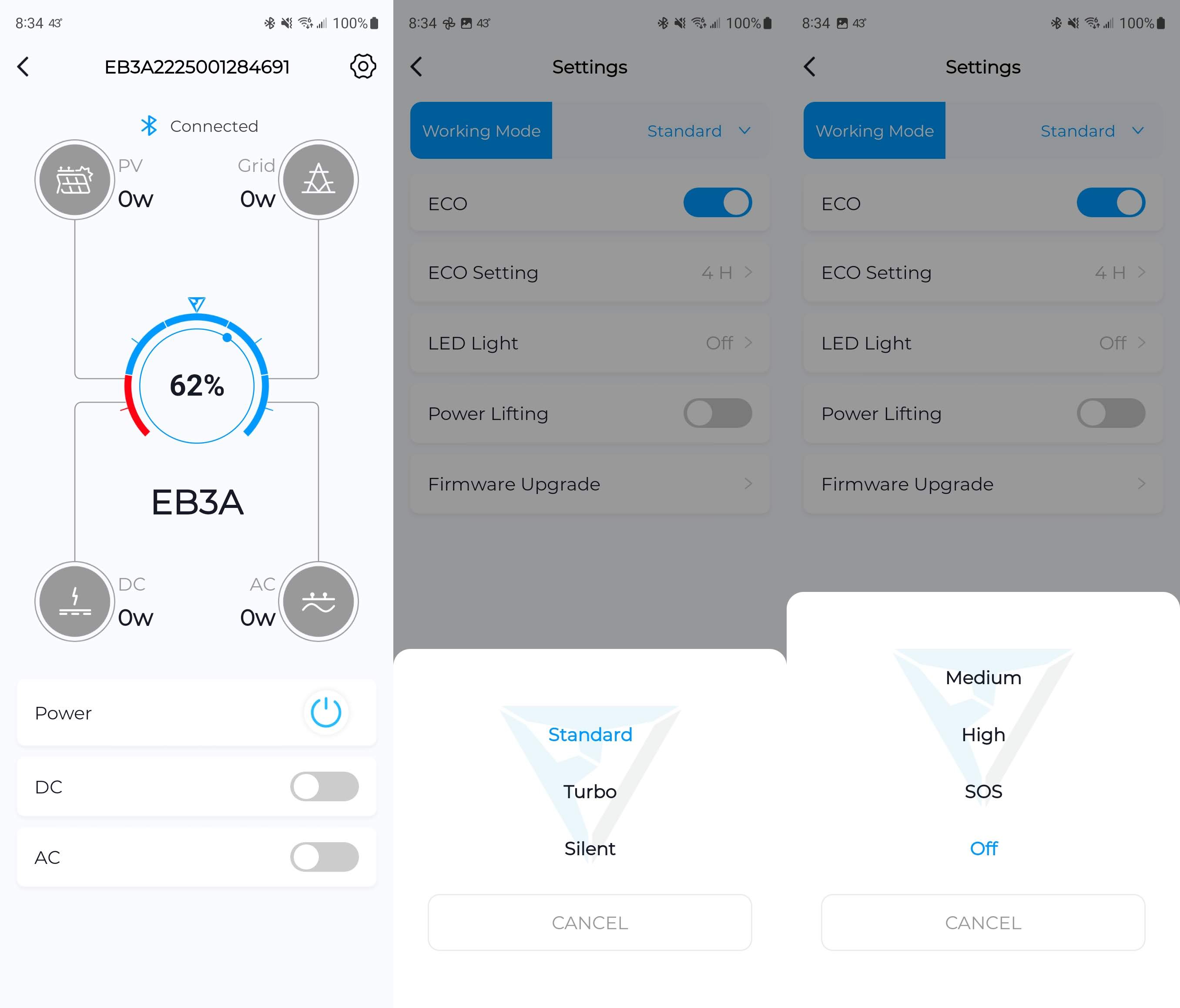
One feature that really surprised me to see in the Bluetti EB3A is the UPS function. A UPS acts as a battery backup for when there is a power outage to keep essential devices running, like lights, computers, medical equipment, and more.
Once the power station is fully charged and plugged into a wall outlet, any devices plugged into the unit AC outlets of the EB3A will continue to operate should the electricity go out. When the unit is fully charged and plugged into the wall, the power bypasses the batteries and goes directly to the power station's outlets. Then when the power goes out, it switches over to the batteries. This is an excellent feature for any power station, especially smaller ones like this.
Bluetti EB3A portable power station: What's not good
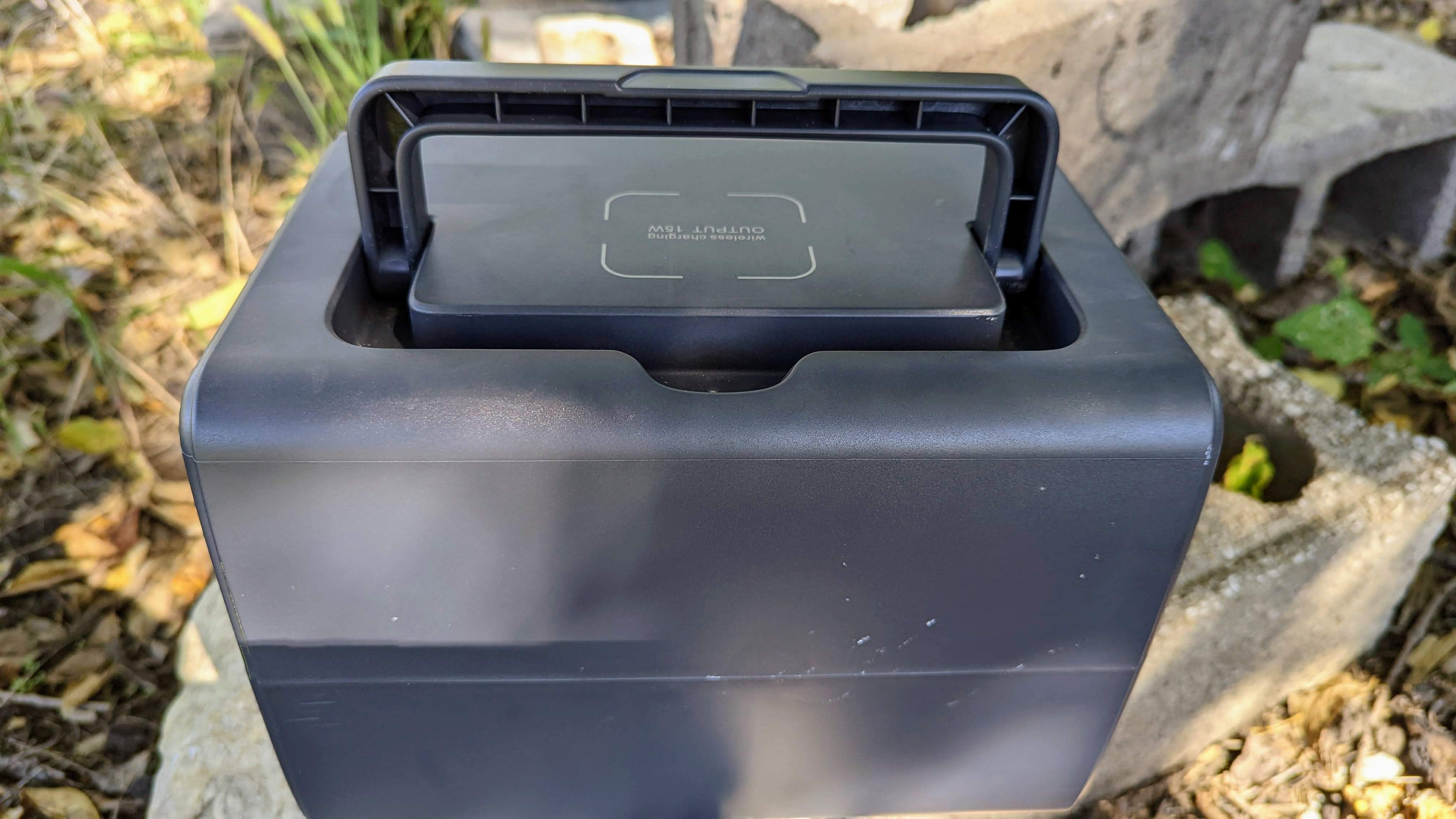
If it seems like the Bluetti EB3A power station is sounding pretty great, that's because it is. But there are a couple of small things that could be better and one that could potentially be a big issue.
Starting small, I wish there were more ports on the power station — specifically AC outlets and USB-C. There should be at least two USB-C ports and the two AC outlets are fine, but I'd like to have seen at least three. While the front of the unit where everything but the wireless charging pad is located is pretty full as it is, the input ports could have been moved to the back of the unit opening up the front for more ports. This would also keep the charging cable out of the way while using the output ports.
For the most part, there is very little to dislike about the EB3A aside from the potential issues the Power Lifting feature could cause.
The other minor issue I have with the Bluetti EB3A is the handle. I like that it folds flat and kind of clicks down for storage, but lifting the handle from its stored position can be annoying. It may be my fat fingers, but it's an annoyance nonetheless. The other thing about the handle is that it doesn't feel as high of quality as the rest of the device. It feels hollow, which I'm sure it is, and doesn't exude durability.
The potentially problematic part of the power station is also a selling point — the Power Lifting feature. The way this unit achieves the ability to power devices up to 1200W degrades the pure sine wave that many electronics require to operate properly. Things like a space heater, a hot plate, a hair dryer, or other appliances will likely work OK. But something with a microprocessor that needs that pure sine wave could get damaged when using this feature.
Bluetti EB3A portable power station: Competition
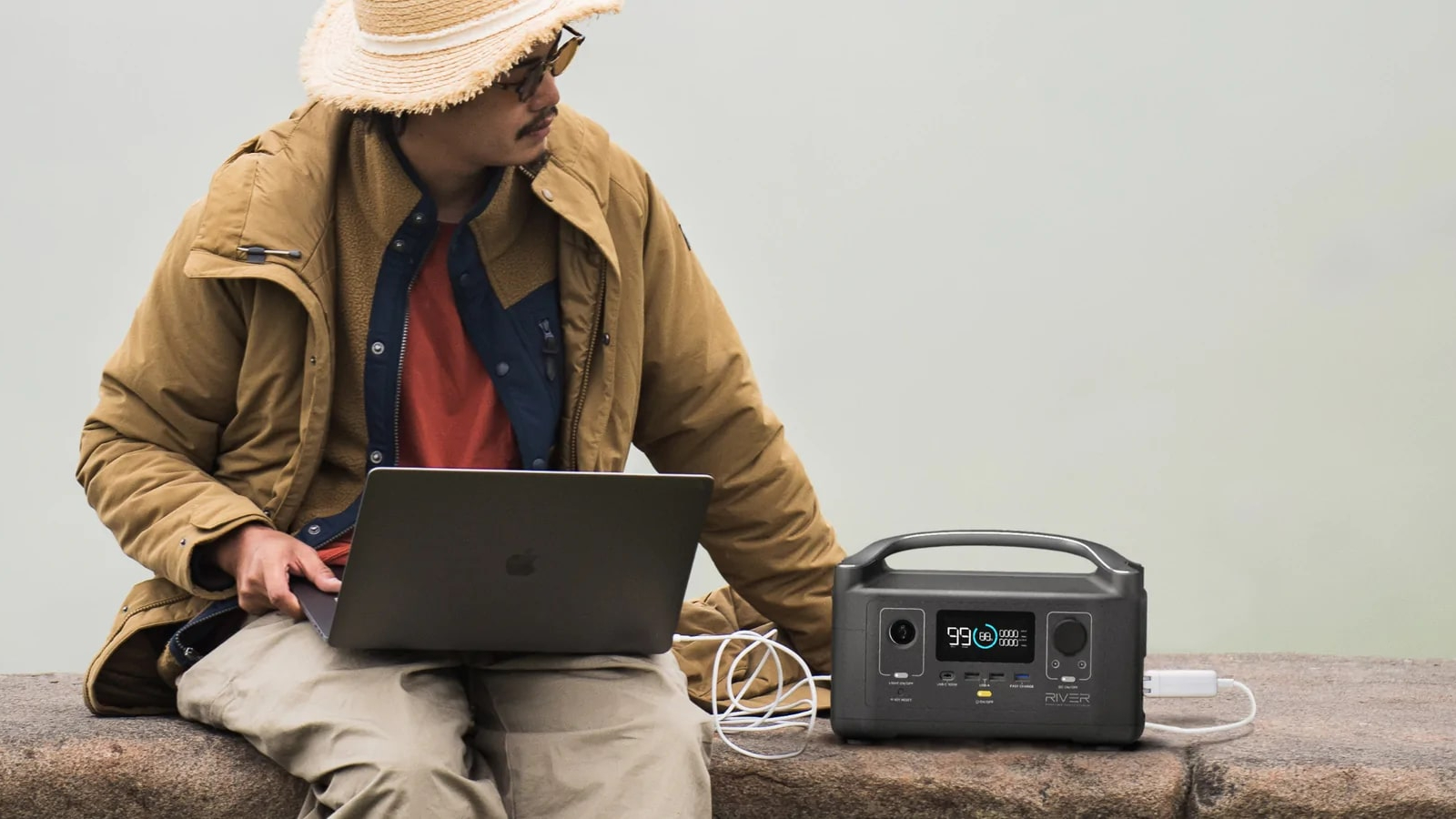
Portable power stations are quickly growing in popularity, and Bluetti is one of the leaders in the space. Two other brands up there with them are EcoFlow and Anker. Each of these brands is very established and offers a range of power stations to handle various electrical situations.
The closest model that EcoFlow offers in terms of features and price to the Bluetti EB3A is the River. Like the Delta Pro I reviewed previously and the Delta 2 I'm currently testing, the River is full of great features, like the larger 288Wh battery capable of up to 1800W of output. Should that capacity not suffice for your needs, the River is expandable with add-on batteries from EcoFlow. You get three AC outlets rather than the two on the EB3A and a third USB-A port. But the same single USB-C port.
EcoFlow has an app as well that can control a multitude of functions for the power station. Charing the River is done via a single cable and can go from 0 - 80% in about an hour, longer than the EB3A. EcoFlow also has managed to include a similar UPS function that is found in the Bluetti power station. The River is also slightly larger and heavier than Bluetti's offering, but not by much. Pricing for the River is around $350.
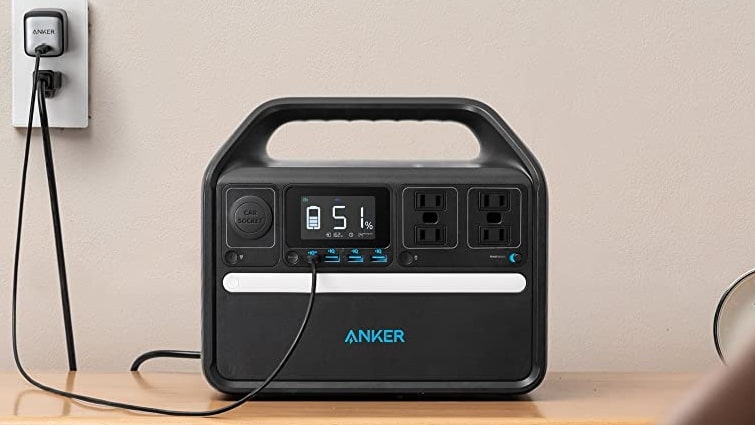
As for Anker, its closes competitor to the Bluetti EB3A is the 535 PowerHouse, which sits between the 757 PowerHouse and the PowerHouse II 400. This is a 500W power station with a surge rating of 750W, with that power coming from a larger 512Wh cell. Anker is known for its high-quality inverters that operate very efficiently. But most of their power stations lack some features found in many others, including the EB3A.
You'll get a single USB-C port, but it's only rated at 60W rather than the 100W of the EB3A. You do get four AC outlets on the 535 and three USB-A ports. I do think Anker's LED light bar is a nicer area lamp than the EB3A with its warm glow. But you won't get the fast charge rates of the Bluetti EB3A or the EcoFlow River, nor will you have any app control. The Anker 535 PowerHouse also comes at a higher price, selling for around $600.
Bluetti EB3A portable power station: Should you buy it?
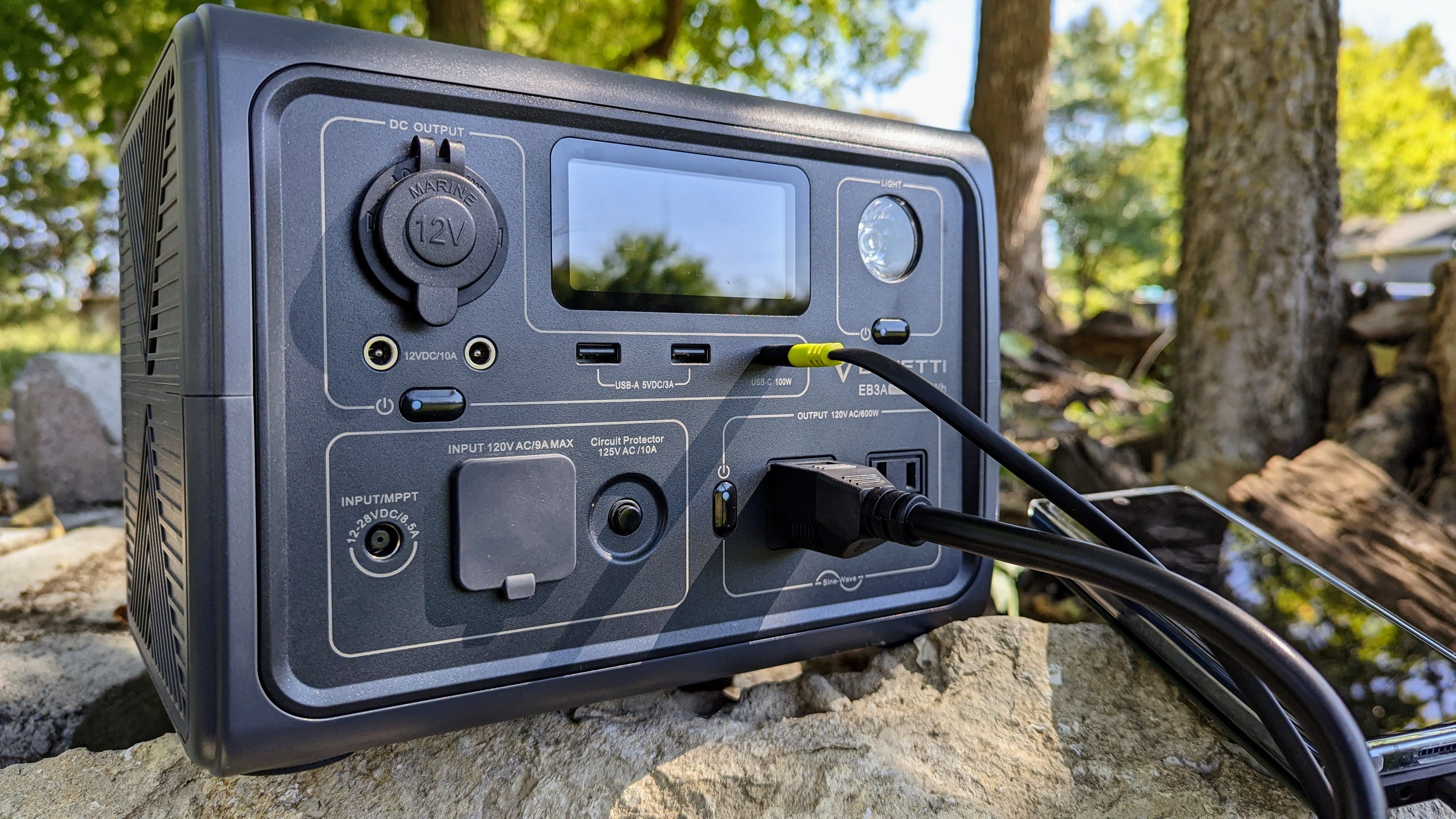
You should buy this if...
- You want a compact power station.
- You want a portable power station capable of running devices requirements up to 1200W.
- You want to use your power station as a UPS backup.
- You don't want to spend a lot of money.
You should not buy this if...
- You need more than two AC outlets and more than one USB-C port.
- You need to power electrically sensitive devices that require more than 600W of power.
Bluetti's EB3A is a fantastic portable power station from multiple aspects. The rated 600W from this diminutive device is very impressive, and the Power Lifting feature that allows the unit to run high-wattage machines is a great add-on—using the EB3A as an automatic power backup is a very welcomed inclusion.
It would have been nice had Bluetti been able to give at least one more AC outlet and USB-C port. But the choice to ditch the bulky charging brick almost makes up for the lack of additional output options. You will need to be aware of the electrical requirements of devices requiring more than the standard 600W pure sine wave output so as not to damage those items.
When looking at the Bluetti EB3A portable power station as a whole, it is a clear winner. Considering all the features, this unit offers packed into the very small footprint coming in under $300 is an impressive feat. With proper power expectations, the EB3A will satisfy far more than much of the competition can.
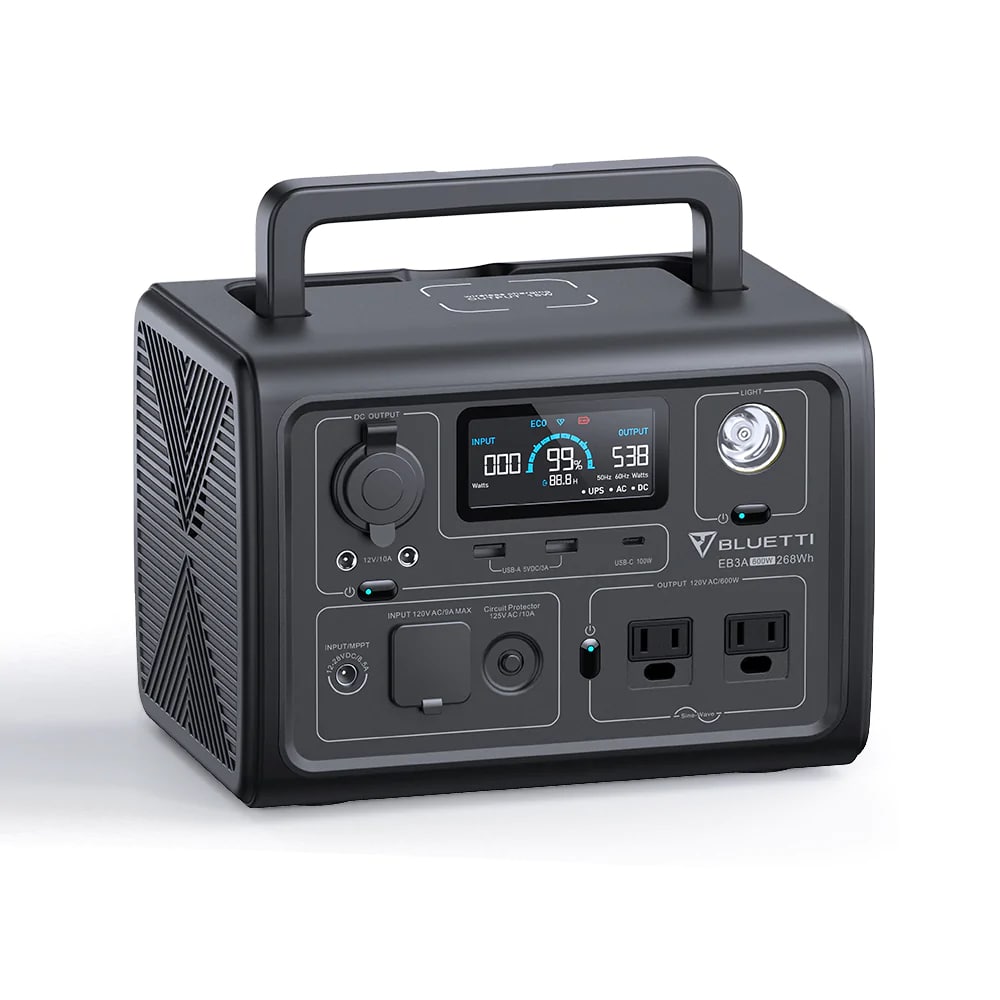
The EB3A is a fantastic power station that can run most small devices and appliances with its 600W output. Using the Power Lifting feature, you can use some higher wattage devices up to 1200W but not electrically sensitive ones. Add in the ability to act as a UPS backup, and this portable power station is ready for nearly anything.

